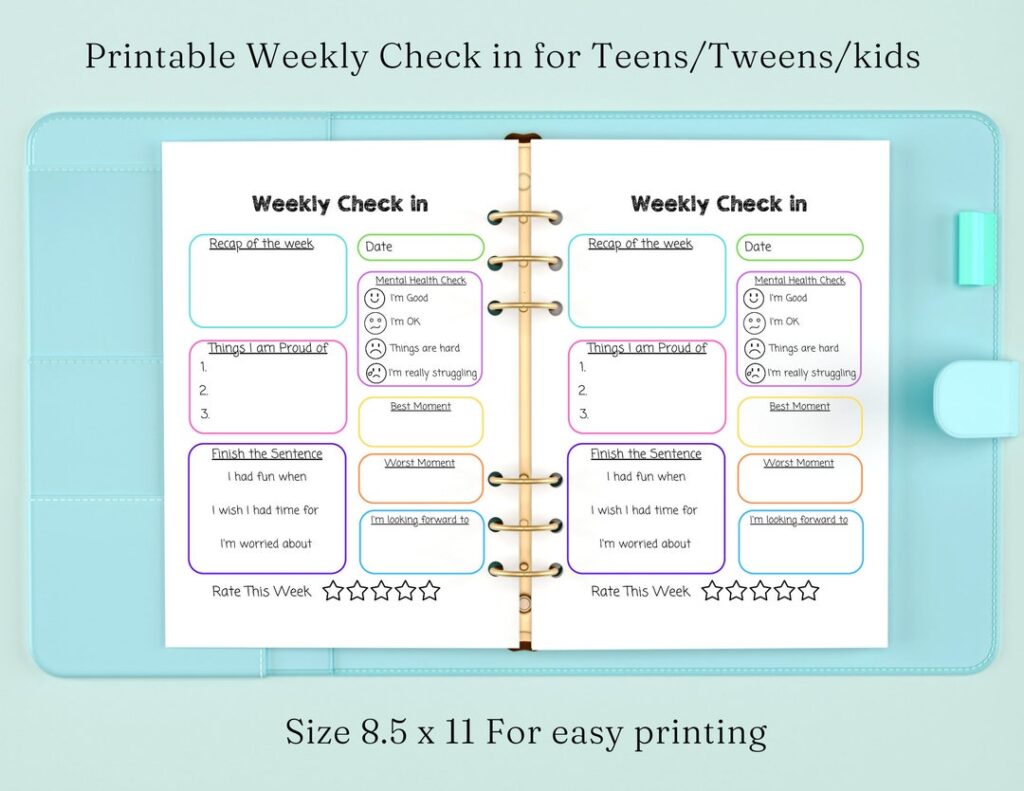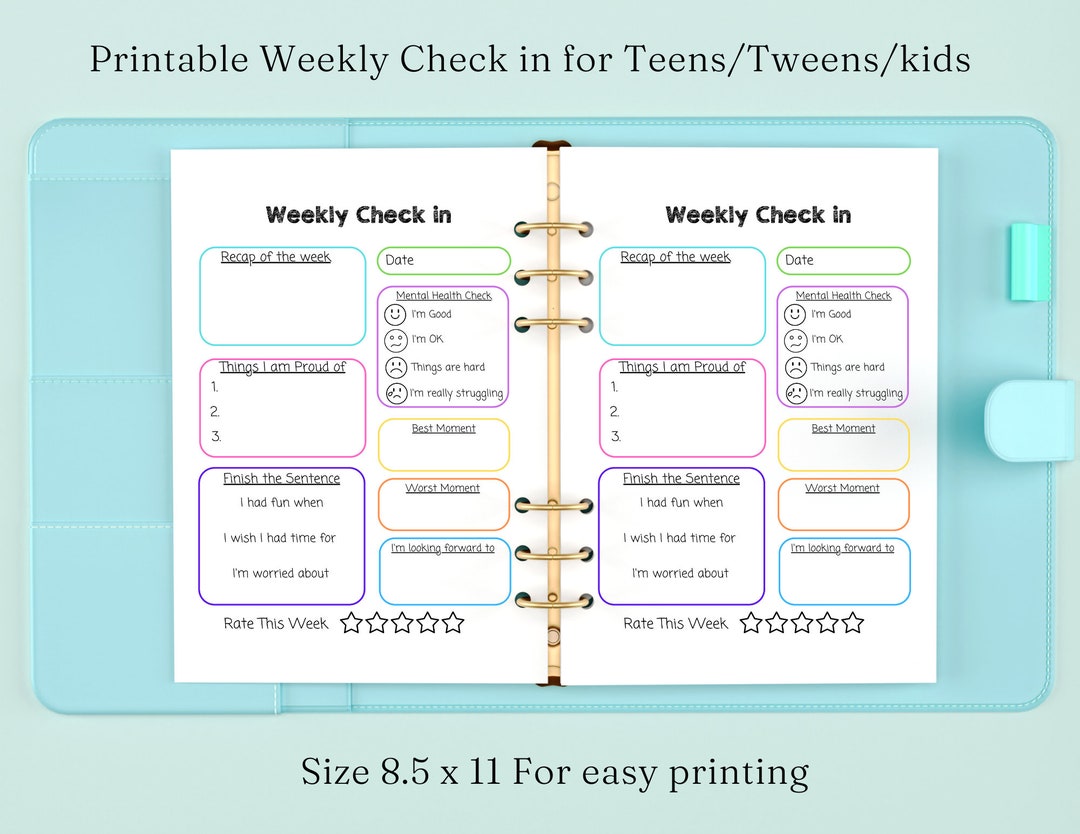
Check-In Questions for Teens: Fostering Connection and Understanding
Navigating the teenage years can be a complex journey, filled with emotional ups and downs, academic pressures, and evolving social dynamics. As parents, educators, or mentors, it’s crucial to establish open lines of communication with the teens in our lives. One effective way to do this is through regular check-ins, using thoughtful check-in questions for teens to foster a deeper understanding of their well-being and experiences. These aren’t interrogations, but rather opportunities for connection and support. The goal is to create a safe space where teens feel comfortable sharing their thoughts, feelings, and concerns without judgment. By asking the right check-in questions for teens, we can build stronger relationships, identify potential challenges early on, and provide guidance as they navigate this transformative stage of life.
Why Are Check-In Questions for Teens Important?
Teenagers often struggle to articulate their emotions or may be hesitant to initiate conversations about difficult topics. Asking specific, targeted check-in questions for teens can break down these barriers and encourage them to open up. Regular check-ins offer numerous benefits, including:
- Improved Communication: Check-in questions create a structured opportunity for dialogue, fostering better communication between teens and adults.
- Early Identification of Issues: By regularly checking in, you can identify potential problems, such as bullying, academic stress, or mental health concerns, before they escalate.
- Strengthened Relationships: Showing genuine interest in a teen’s well-being strengthens the bond between them and the adults in their lives.
- Increased Self-Awareness: Answering check-in questions for teens can help teenagers reflect on their own thoughts, feelings, and behaviors, promoting self-awareness.
- Enhanced Emotional Intelligence: Regular check-ins can help teens develop their emotional intelligence by encouraging them to identify and express their emotions.
Types of Check-In Questions for Teens
The types of check-in questions for teens you ask will depend on the context of the conversation, the teen’s personality, and your relationship with them. Here are some examples categorized by topic:
General Well-Being
- How are you feeling today? (On a scale of 1 to 10)
- What’s been the best part of your day so far?
- What’s been the most challenging part of your day?
- Is there anything you’re looking forward to?
- Is there anything that’s been weighing on your mind?
- How have you been sleeping lately?
- Have you been eating healthy meals?
- How is your energy level?
School and Academics
- How are your classes going?
- Are you feeling challenged in your classes?
- Are you understanding the material?
- Do you need any help with your homework?
- Are you feeling stressed about any upcoming tests or projects?
- Are you getting along with your teachers?
- Are you feeling pressured to perform well academically?
Social Life and Relationships
- How are your friendships going?
- Are you feeling connected to your friends?
- Are you experiencing any conflicts with your friends?
- Are you feeling pressured to do things you’re not comfortable with?
- Have you experienced any bullying or harassment?
- Are you feeling lonely or isolated?
- Are you dating anyone? If so, how is that going?
Mental and Emotional Health
- How are you feeling emotionally?
- Are you feeling anxious or stressed?
- Are you feeling sad or depressed?
- Are you feeling overwhelmed?
- Are you having any thoughts of self-harm? (If so, seek professional help immediately)
- What are some things that make you feel happy or calm?
- What are some things you do to cope with stress?
- Have you been practicing self-care?
Future Goals and Aspirations
- What are your goals for the future?
- What are you passionate about?
- What are you good at?
- What do you want to learn more about?
- What are your career aspirations?
- What are your plans after high school?
- What can I do to support your goals?
Tips for Asking Check-In Questions for Teens
Asking check-in questions for teens effectively requires sensitivity, patience, and a genuine desire to understand their perspective. Here are some tips to keep in mind:
- Choose the Right Time and Place: Find a quiet, comfortable setting where you can have an uninterrupted conversation. Avoid asking check-in questions when the teen is busy, stressed, or in a public place.
- Be Present and Attentive: Put away your phone, make eye contact, and actively listen to what the teen is saying. Show that you are genuinely interested in their thoughts and feelings.
- Ask Open-Ended Questions: Avoid questions that can be answered with a simple “yes” or “no.” Instead, ask open-ended questions that encourage the teen to elaborate and share more details.
- Listen Without Judgment: Create a safe space where the teen feels comfortable sharing their thoughts and feelings without fear of judgment or criticism. Avoid interrupting, lecturing, or offering unsolicited advice.
- Validate Their Feelings: Acknowledge and validate the teen’s feelings, even if you don’t agree with them. Let them know that their emotions are valid and that you understand how they feel.
- Offer Support and Encouragement: Let the teen know that you are there for them and that you want to support them in any way you can. Offer words of encouragement and help them brainstorm solutions to their challenges.
- Respect Their Privacy: If the teen is not comfortable sharing something, respect their boundaries and don’t pressure them to talk about it. Let them know that they can always come to you when they are ready.
- Be Consistent: Make check-ins a regular part of your routine. Consistency helps build trust and makes it easier for teens to open up over time.
Examples of Check-In Scenarios
Here are a couple of example scenarios demonstrating how to use check-in questions for teens:
Scenario 1: After a Difficult Test
Parent: “Hey, I know you had a big test today. How are you feeling about it?”
Teen: “Not great. I think I failed.”
Parent: “I’m sorry to hear that. What made it so difficult?”
Teen: “I just couldn’t remember anything. I studied, but my mind went blank.”
Parent: “That sounds frustrating. Is there anything I can do to help you prepare for the next test? Maybe we can review the material together?”
Teen: “Maybe. Thanks, Mom.”
Parent: “Of course. I’m here for you. Remember, one test doesn’t define you. We can figure this out together.”
Scenario 2: Noticing a Change in Mood
Teacher: “Hey [Teen’s Name], I’ve noticed you seem a little down lately. Is everything okay?”
Teen: “I don’t know. I’m just tired.”
Teacher: “Is there anything going on that’s making you feel tired or stressed?”
Teen: “Not really. Just school.”
Teacher: “School can be tough. Are you feeling overwhelmed with your workload?”
Teen: “Yeah, kind of.”
Teacher: “Have you talked to your counselor about it? They might have some helpful strategies for managing your time and stress.”
Teen: “No, but I might.”
Teacher: “I can connect you with them if you’d like. Just know that I’m here to listen if you ever need to talk.”
The Importance of Professional Help
While check-in questions for teens can be a valuable tool for fostering connection and understanding, it’s important to recognize when professional help is needed. If you suspect that a teen is struggling with a serious mental health issue, such as depression, anxiety, or suicidal thoughts, it’s crucial to seek professional support from a therapist, counselor, or psychiatrist. These professionals have the expertise to diagnose and treat mental health conditions and can provide teens with the support they need to thrive. [See also: Teen Mental Health Resources]
Conclusion
Using thoughtful check-in questions for teens is an essential step in building strong relationships, identifying potential challenges, and providing support as they navigate the complexities of adolescence. By creating a safe and supportive environment where teens feel comfortable sharing their thoughts and feelings, we can help them develop into confident, resilient, and well-adjusted adults. Remember that consistency, empathy, and a genuine desire to understand are key to effective check-ins. Keep asking those check-in questions for teens! [See also: Building Trust with Teenagers] These simple questions can make a world of difference in a teen’s life. Don’t underestimate the power of a simple conversation to foster connection and provide support. The insights gained from asking the right check-in questions for teens are invaluable for promoting their well-being and helping them thrive. Making these conversations a regular part of your routine can significantly improve your relationship with the teen and help them navigate the challenges of adolescence with greater confidence and resilience. Continue to prioritize these check-in questions for teens to create a supportive and understanding environment. These check-in questions for teens are a powerful tool, promoting open communication and a deeper understanding of their experiences.

